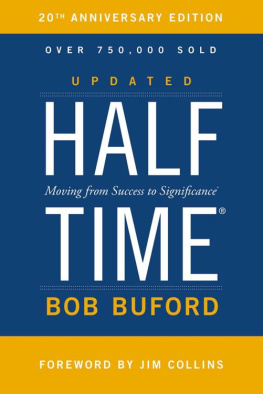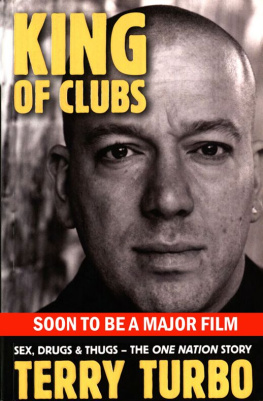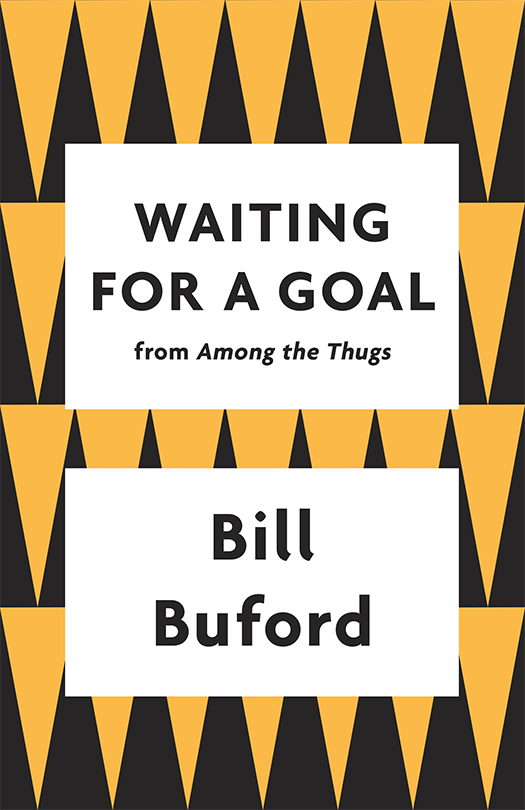Bill Buford
Bill Buford is the author of Among the Thugs, Heat, and the forthcoming Dirt, the story of dragging his loving and trusting family to Lyon for five years in order for him to become a French cook. From 1995, until he left for France, in 2008, Buford was at the New Yorker, first as Literary and Fiction Editor and then as a staff writer. He lived in England for eighteen years and revived the literary magazine Granta. He was born in Baton Rouge, Louisiana, and now lives in New York City with his wife, Jessica Green, and their French-speaking sons, George and Frederick.
Also by Bill Buford
Among the Thugs
Heat: An Amateurs Adventures as Kitchen Slave, Line Cook, Pasta-Maker, and Apprentice to a Dante-Quoting Butcher in Tuscany
Waiting for a Goal
from Among the Thugs
Bill Buford
A Vintage Short
Vintage Books
A Division of Random House LLC
New York
Copyright 1990, 1991 by William Buford
All rights reserved. Published in the United States by Vintage Books, a division of Random House LLC, New York, a Penguin Random House company. Waiting for a Goal was originally published as part of Among the Thugs in Great Britain by Martin Secker & Warburg Ltd in 1991, and subsequently published in the United States by W.W. Norton & Company, Inc., New York, in 1992. Originally published in trade paperback by Vintage Books, a division of Random House LLC, New York, in 1993.
Vintage and colophon are registered trademarks of Random House LLC.
Cover design by Joan Wong
The Cataloging-in-Publication Data for Among the Thugs is available from the Library of Congress.
Waiting for a Goal Vintage eBook ISBN: 978-1-101-87309-0
www.vintagebooks.com
v3.1_r2
Contents
The thousands stand and chant. Around them in the world, people ride escalators going up and sneak secret glances at the faces coming down. People dangle tea-bags over hot water in white cups. Cars run silently on the autobahns, streaks of painted light. People sit at desks and stare at office walls. They smell their shirts and drop them in the hamper. People bind themselves into numbered seats and fly across time zones and high cirrus and deep night, knowing there is something theyve forgotten to do.
The future belongs to crowds.
Don DeLillo
Mao II (1991)
I WANT TO describe the experience of waiting for a goal.
In January 1990, I attended an evening match played by Cambridge United, in the small, exposed Abbey Stadium on the edge of town. The match was one of the final rounds of the FA Cup, a knockout competition that the Cambridge teamat the time in the Fourth Divisionhad survived longer than its supporters could have reasonably expected. The match was a replay: three days before, Cambridge United had met Millwall for the first time, making the historic journey to the Den, and had come away with a draw. Tonights match would decide which team went into the quarterfinals. No Fourth Division team had got beyond the quarterfinals.
I entered the ground and found myself among the supporters pressed up against the fence near the halfway line. It took some minutes before I could get to a position where I could watch the game without being obstructed, and once there I retained possession of my spot by holding on to the perimeter rail. I was on my own. On my left was a man of about fifty, a face full of friendly creases, smelling strongly of American cigarettes, with ash eyebrows and tobacco-stained teeth. Behind me were three ladsone, to keep his balance, rested his forearm on my shoulders. On my right was a woman with her boyfriend; she was in her twenties with short blonde hair and was pressed into my side. Otherschildren, police, the stadium stewardswere having to squeeze past constantly, as access to the pitch was through a locked gate in front of me.
I was not a supporter of the Cambridge team; I was there out of curiosity (it was Millwalls first visit to the city), but I surprised myself by how engaged I became by the match. In a matter of minutes, I was cheering, even singing, along with everyone elsemy voice, slightly high-pitched, as foreign sounding to me as the voices around me. I groaned when the crowd groaned, and when it surged in one direction, and we all had to tumble with it, I instinctively reached out for the people near me, clinging to stay upright. And when the crowd surged back again and we all tumbled back with it, I found that these same people were reaching out for me. Having just walked in from the street, I had stepped into a situation of unusual intimacy, and while I hadnt said more than a few words to the people near mewe were pressed too closely together to have a conversationsomething was being communicated between us. Something, I felt, was being communicated between everyone there: just about every member of that crowd of nine thousand people was pressed closely against someone else and was held, as we were held, tightly together, waiting for a goal.
In the opening minutes, it seemed that we might see one. Millwall was then in the First Division, but it was the Cambridge team that was dominating the game, although not with much finesse. Its players were aggressive and had little style, but they were tenacious and seldom lost possession of the ball. They were the ones making the shots on goal. In the first three minutes, the Millwall goalkeeper had to make two dramatic saves, including one in which he got his hand up to send the ball inches over the net at the last possible moment. Two minutes later, the ball was slammed against the post. Ten minutes later, another was slammed against the crossbar.
I watched the goalkeeper. His name was Keith Branagan, and this was his first match against Cambridge, his former team, since it had traded him to Millwall for a large sum of moneythe largest that the Cambridge club had got for one of its players. There might have been a hidden agendaBranagan out to show his former supporters what they had lostalthough it was more likely that, being an exceptional goalkeeper, he simply played exceptionally. With Cambridge United firing so insistently at the goal, Branagan was emerging as the most conspicuous talent on the pitch. After a while I felt there was more to it: that there was some mysterious force at work around his goalsomething greater than Branagans talentthat was preventing the ball from entering it. I felt that the ball would never enter the net and that it would be unnatural if it did.
There was no score in the first half, and during half time everyone on the terraces relaxed visibly. There was more room; without the excitement, the supporters seemed to diminish in size. They had stopped moving around, and there was no need to cling to anyone for support. To have touched someone now would have been wrong. A conversation would have been possible, but a conversation did not seem right either. I had nothing more than the most perfunctory exchanges with the people near me. Friends and partners were the only ones speaking. Strangers had become strangers again. Our privacy had been reclaimed.
The game resumed.
The second half started off in the same spirit as the first forty-five minutesbrutal and ineffective. Uniteds play was relentless, but it was difficult to see how, at this pace, its players would last out the match. They were very physicaland responsible for most of the foulsand if they didnt score within the first fifteen minutes, I didnt believe that they would score later. They would be exhausted; they would be lucky to hold on to a goalless draw. That was what it would be: another goalless draw.













